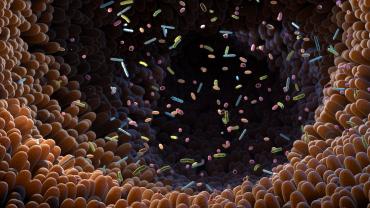
Recent research has explored the changes to the gut microbiome that occur during the aging process and their potential significance. The integrity of the gut microbiome has been shown in clinical studies to differ between young adults and older individuals. Multiple clinical studies have reported changes in short-chain fatty acid (SCFA) production and age-related changes in the populations of some taxa, including Bifidobacteria and Firmicutes. Age-related decreases in Bifidobacterium and Firmicutes have been associated with immunosenescence and the inflammatory response. Centenarians have been observed to have a relatively higher abundance of Christensenellaceae, which is associated with certain parameters related to healthy aging. A recently published review article by Zeppa and colleagues explored the relationship between healthy aging and the potential to support gut microbial health.
Resveratrol is one agent that the authors describe as potentially supportive of age-related changes and the gut microbiome. Resveratrol (trans‑3,4’,5 trihydroxystilbene) is a molecule found in grape skin, berries (such as blueberries and raspberries), and peanuts. It is known for its role in supporting antioxidative status and inflammation, and for its support of cardiovascular and metabolic functions within the human body. Research indicates that resveratrol may also help support immune health, a healthy gut microbiome, and the body’s response to cellular senescence. Animal studies have reported increases in the relative abundance of Bifidobacterium, Lactobacillus, Bacteroides, and Akkermansia in the presence of resveratrol. Resveratrol has also been shown to support a healthy Firmicutes to Bacteroidetes ratio and help support microbial diversity.
Zeppa and colleagues also describe the potential supportive role of prebiotics for microbial health. Prebiotics are compounds that have a specific effect on the gastrointestinal (GI) microbiome and help stimulate the activity of the targeted intestinal microbe to potentially help improve human health. To be classified as a prebiotic, the compound must not be absorbed in the GI tract and should instead be fermented by GI microbes. Examples of prebiotics include fructans (such as inulin), fructooligosaccharide (FOS), and galactooligosaccharides (GOS). GOS has been shown in studies to stimulate several genera of beneficial microorganisms including Bacteroidetes, Firmicutes, Enterobacteria, and Lactobacilli. Studies also indicate that GOS may help prevent the decline of Bifidobacteria related to the aging process.
A clinical study involving the administration of 7.4 g of FOS daily for 9 weeks in elderly individuals observed improvements in certain age-related changes and decreases in serum glucose levels. However, the sample size was small, and more clinical research is needed before conclusions can be made. Another clinical study involving FOS and inulin administration in elderly patients reported improvements in indices related to frailty.
Probiotics may also help support the gut microbiome and healthy aging. A meta-analysis of controlled clinical studies involving probiotic supplementation in elderly individuals reported improvements in natural killer (NK) cell activity and phagocytic qualities of polymorphonuclear cells. A study involving supplementation with Bacillus subtilis observed improvements in parameters related to immune health, including increased secretory Immunoglobulin A concentrations compared with a placebo in elderly patients. Probiotics may also help promote healthy aging by supporting the body's response to certain pathogenic microbes, healthy inflammation, and digestive health.
More research is needed to determine the significance of age-related changes to the gut microbiome. However, evidence suggests that certain agents, such as probiotics, prebiotics, and nutraceuticals, such as resveratrol, may help support gut microbial integrity and healthy aging.
By Colleen Ambrose, ND, MAT